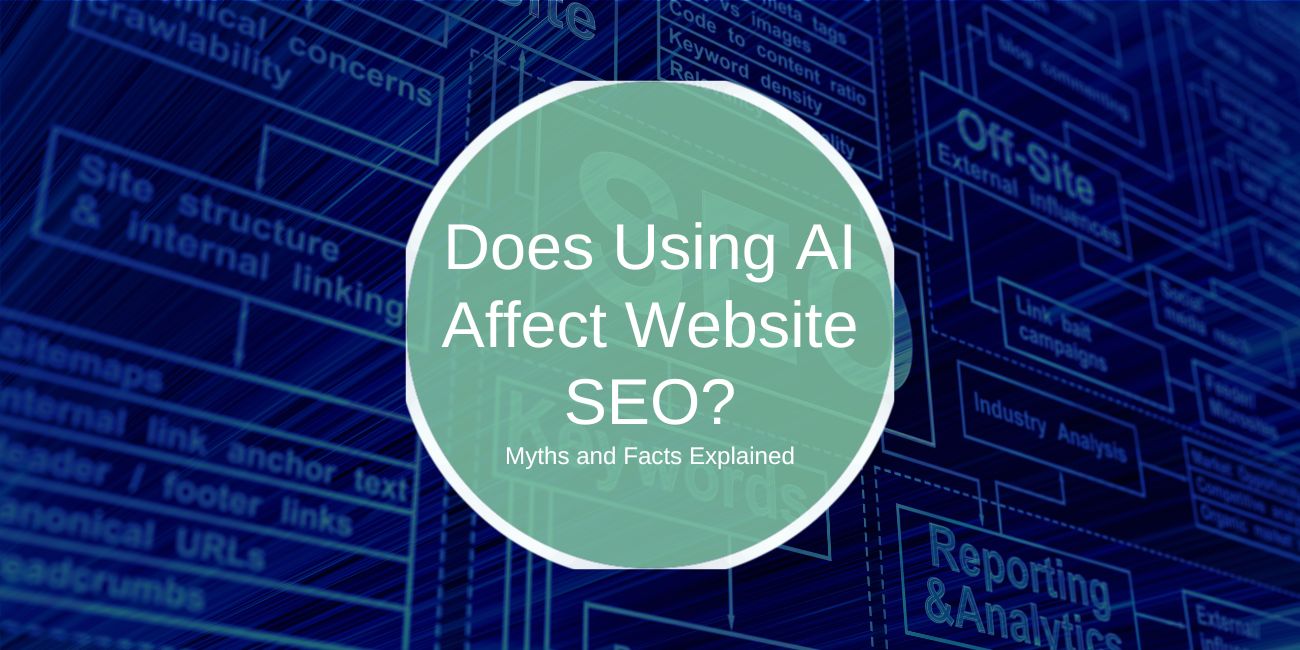Artificial intelligence (AI) is changing how we create and manage content, making it easier and faster to produce high-quality material. But does using AI for content creation help or hurt your website’s SEO? The answer depends on how you use it. Let’s break down Google’s guidelines, the pros and cons of AI in SEO, and best practices to ensure your content ranks well.
Google’s Stance on AI-Generated Content

Google doesn’t penalize AI-generated content as long as it’s helpful, relevant, and valuable to users. They focus on the quality of content, not the method of creation. According to Google:
“Using AI does not inherently violate our guidelines. As long as content is helpful, relevant, and valuable to users, it will rank.”
In February 2023, Google introduced its “helpful content” update, which rewards material that satisfies user intent. Whether your content is AI-written or human-made, the key is to provide meaningful information. Poor-quality content—AI-generated or not—won’t perform well.
Example: If a blog post answers a user’s question comprehensively, it can rank well regardless of whether it was created with AI. However, a poorly written article stuffed with keywords will perform poorly, no matter how it’s created.
For more details, check Google’s official blog: Google’s Guidance on AI Content.
How AI Impacts Website SEO
AI can be a game-changer for SEO when used effectively, but misuse can lead to setbacks. Let’s break this down into positive and negative impacts.
Positive Impacts of AI on SEO
- Faster Content Production: AI tools like Jasper AI and ChatGPT help generate content quickly. This is ideal for scaling blog posts, product descriptions, and landing pages.
- SEO Optimization: AI tools like Surfer SEO and SEMrush help optimize keywords, match search intent, and fine-tune on-page SEO elements like headers and meta tags.
- Data Insights: AI excels at analyzing trends, keywords, and competitor performance. These insights make it easier to identify content opportunities and optimize for high-ranking topics.
- Better Content Quality: Tools like Grammarly improve grammar and readability, while others ensure your content maintains a consistent tone and style.
Negative Impacts of AI on SEO
- Generic or Repetitive Content: AI can sometimes produce bland or repetitive text, which may not meet Google’s E-A-T standards (Expertise, Authoritativeness, Trustworthiness).
- Over-Reliance on AI: Depending too much on AI without human editing can lead to inaccurate or irrelevant content, which can hurt your rankings and user trust.
- Thin Content: AI-generated content can sometimes lack depth, failing to fully address user queries. Thin content often doesn’t perform well in search rankings.
Google’s Ranking Factors and AI’s Role
Google uses several key factors to determine how content ranks in search results. These include content quality, user experience, and E-A-T (Expertise, Authoritativeness, Trustworthiness). While AI can support efforts in all these areas, it works best when combined with human input. Let’s break this down further.
Content Quality

Google places a high value on unique, high-quality content that meets user needs and provides meaningful answers to their queries. AI tools are excellent at structuring content, identifying keyword opportunities, and even generating drafts quickly. However, AI often struggles with nuances like emotional appeal, in-depth analysis, or industry-specific expertise.
How AI Helps:
- AI tools can identify trending topics or high-value keywords and suggest how to structure your content.
- Platforms like ChatGPT can draft articles efficiently, saving time on routine tasks.
While AI can create the base content, human oversight is essential to ensure the material is engaging, accurate, and aligned with the audience’s expectations. Adding personal anecdotes, actionable insights, or creative storytelling is something AI can’t fully replicate.
Example: AI might generate a guide on “How to Choose the Best Running Shoes” with generic advice, but a human expert can refine it by including insights like shoe durability tests, personal recommendations, or niche considerations (e.g., for trail runners).
User Experience (UX)

User experience plays a significant role in rankings. Metrics like bounce rate, time spent on page, and click-through rate signal to Google whether users find your content valuable.
How AI Helps:
- AI tools like Hotjar or Crazy Egg analyze user behavior on your website, such as where users drop off or which sections they interact with most.
- AI-driven content platforms can suggest layout improvements, call-to-action placements, and readability enhancements to improve engagement.
Example: If analytics show that readers leave your blog after 20 seconds, an AI tool can recommend shortening introductions, adding engaging visuals, or breaking up long paragraphs for better readability.
While AI identifies problems and provides solutions, humans need to implement these changes thoughtfully. Balancing design aesthetics, branding, and functionality requires a human touch.
Example: AI may suggest moving a call-to-action button higher on the page, but a designer can ensure it matches your brand’s visual style and appeals to your audience.
E-A-T (Expertise, Authoritativeness, Trustworthiness)

Google emphasizes E-A-T to ensure users receive reliable and valuable information. This is especially critical for content in health, finance, or other sensitive industries.
How AI Helps:
- AI tools like Jasper AI or ChatGPT can generate factual and structured content.
- By analyzing authoritative sources, AI can suggest references or credible citations to back up claims.
Example: For a blog on “Top Benefits of a Plant-Based Diet,” AI might generate a list of benefits and suggest linking to studies from reputable journals like the National Institutes of Health (NIH).
Establishing expertise and trust requires human input. This includes fact-checking AI-generated content, incorporating unique insights, and building authority through personal branding or credentials.
Example: An AI-generated article may summarize existing studies, but an author with a nutrition degree can add credibility by sharing their professional experiences or research.
Best Practices for Using AI in SEO Content
To maximize the benefits of AI without harming your SEO, follow these guidelines:
- Focus on User Intent: AI tools are great at generating content, but the content must answer user questions and provide value. Avoid keyword stuffing or generic information that doesn’t satisfy the reader’s needs.
- Blend AI with Human Editing: AI creates the foundation, but humans should refine the content. Fact-check, adjust for tone, and add unique perspectives to make the content more engaging and trustworthy.
- Prioritize Readability Over Keywords”: While AI can suggest keywords, the final text should feel natural and easy to read. Google values user experience over keyword density.
- Audit Content Regularly: Use tools like Google Analytics or Search Console to track the performance of AI-generated content. Update or optimize pieces that aren’t performing well.
Common Misconceptions About AI and SEO

Here are some common misconceptions that AI users often have about AI, SEO, and content writing:
1. AI Content is Automatically Penalized by Google
Misconception: Google penalizes content created using AI tools.
Reality: Google doesn’t penalize content just because it’s AI-generated. The evaluation focuses on quality, relevance, and helpfulness. If the content meets user needs and aligns with search intent, it will rank just as well as human-written material. However, low-quality content—whether created by AI or humans—will not perform well.
Example: An AI-generated blog post about “10 Tips for Healthy Eating” that offers practical, well-researched advice can rank high. Conversely, a shallow, repetitive article stuffed with keywords, regardless of its source, will not.
2. AI Can Fully Replace Human Writers
Misconception: AI tools can handle the entire content creation process, eliminating the need for human input.
Reality: While AI excels at generating drafts, analyzing data, and automating routine tasks, it struggles with creativity, emotional depth, and cultural context. Human writers are essential to refine AI outputs, infuse unique perspectives, and ensure content matches the brand’s voice and audience preferences.
Example: AI might create a solid draft for a travel blog about “Top Destinations in Europe,” but a human writer can enhance it with personal experiences, storytelling, and insider tips to make it engaging and relatable.
3. AI-Generated Content is Always Generic
Misconception: AI can only produce low-quality, surface-level content.
Reality: With advancements in natural language processing, AI tools can create detailed, specific, and even engaging content when provided with well-structured prompts. The key is human oversight to guide the AI and ensure the output meets the desired quality.
Example: A prompt like “Write a detailed guide on creating a small business marketing plan, including budget tips and audience analysis” can yield a highly structured and useful article.
4. AI Automatically Improves SEO
Misconception: Using AI tools guarantees better search engine rankings.
Reality: AI can assist with keyword research, meta descriptions, and content structure, but it’s not a magic fix. To improve SEO, content must also align with user intent, readability, and engagement. Human efforts are required to ensure the content resonates with the target audience and meets Google’s guidelines.
5. AI Content is Free of Errors
Misconception: AI tools always produce accurate and error-free content.
Reality: AI can sometimes generate inaccurate information, especially on niche topics or when data is limited. Fact-checking and editing are critical to maintain accuracy and credibility.
6. AI Can Handle All Aspects of Content Writing
Misconception: AI tools can independently manage the entire content creation and distribution process.
Reality: While AI is excellent for streamlining workflows, it cannot strategize, adapt to audience feedback, or create personalized campaigns without human direction. AI lacks the ability to interpret broader marketing goals or audience nuances effectively.
7. AI Content is Too Expensive or Complicated to Use
Misconception: Only large companies can afford AI tools, and using them requires technical expertise.
Reality: Many affordable and user-friendly AI tools, such as Jasper AI, Grammarly, and ChatGPT, are available for small businesses and individuals. These platforms often come with intuitive interfaces and tutorials, making them accessible to non-technical users.
8. Overuse of AI Will Result in Keyword Stuffing
Misconception: AI tools create content overloaded with keywords, leading to penalties or poor user experience.
Reality: While some AI tools may produce keyword-heavy drafts, proper prompting and human editing ensure balanced, natural keyword usage that aligns with SEO best practices.
Future of AI in SEO Content Creation

AI will continue to shape how we approach content creation and SEO. As technologies improve, we can expect:
- More Sophisticated Natural Language Processing (NLP): AI tools like ChatGPT will better understand context and intent, producing more nuanced content.
- Enhanced Predictive Analytics: AI will provide deeper insights into keyword trends, user behavior, and competitor performance.
- Hybrid Workflows: Combining AI efficiency with human expertise will become the norm for creating top-performing content.
Conclusion: Does AI Affect Website SEO?
Using AI to create content does not inherently affect SEO rankings. What matters most is whether the content is helpful, relevant, and aligned with Google’s guidelines. AI tools can enhance efficiency and support optimization, but human oversight is essential to ensure quality, originality, and user satisfaction.
By combining the strengths of AI with human expertise, you can create content that ranks well and engages your audience. Remember, the key to SEO success lies in the value your content delivers—not how it’s created.
Have you used AI in your content strategy? Share your thoughts or experiences in the comments below!

